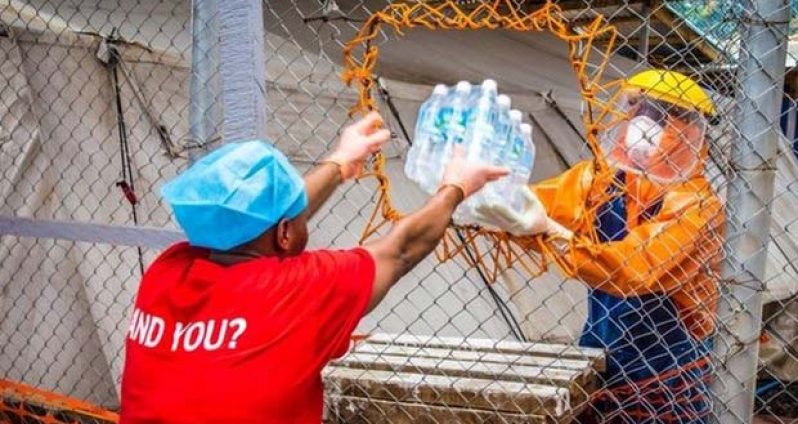By Dr. Prem Misir
THE Western world has suddenly risen from its slumber only to discover that Ebola is killing people in West Africa. What is now even worse for them is that Ebola has arrived in the USA without any visa. And the USA has become frantic and consumed in a state of fear, with President Barack Obama now appointing a Czar to stop Ebola in its tracks.Ebola became a U.S. citizen just a few weeks ago. But this wave of Ebola did not recommence recently. Nevertheless, it looks like ‘recently’ only because Ebola’s visitation upon the U.S. is fresh, and the fact that the Western media have now got something to gossip about. But the Ebola outbreak was not as recent as the Western world would have it.
“Ebola became a U.S. citizen just a few weeks ago. But this wave of Ebola did not recommence recently. Nevertheless, it looks like ‘recently’ only because Ebola’s visitation upon the U.S. is fresh, and the fact that the Western media have now got something to gossip about. But the Ebola outbreak was not as recent as the Western world would have it.”
For it was when on December 6, 2013, a two-year-old boy from Guéckédou, Guinea, became ill, “…no one knew that his illness signalled the start of the biggest, most complex outbreak of Ebola the world has ever seen.” (Lancet, 2014)
But as this latest Ebola outbreak is not new, likewise the Ebola virus is not new. What the world must not forget is that Ebola is not a new disease. It was first identified in the Democratic Republic of Congo in 1976. And almost 40 years later, there still is no approved anti-Ebola vaccine or medicine. Now the Western world is scrambling hysterically to find an anti-Ebola medication, perhaps, in the same way, as the White European colonialists were engaged in the great scramble to own and exploit Africa in colonial times.
I think it is important to say again that HIV and AIDS had better treatment than Ebola at the hands of the Americans and Europeans in the 1980s. I noted in last week’s Perspectives (Misir, 2014) that: “…in those early years in the U.S., there was problematic planning and preparedness for the AIDS pandemic, the scientific advances were well ahead of the planning and prevention mayhem, thus (Bartlett, 1987 p.3): AIDS was first identified in 1981; the etiologic agent was recognised in 1983; the building blocks of HIV’s DNA and RNA were stated in 1985; the Retroviral treatment was made public in 1986; and vaccine clinical trials started in 1987. These dates show that there was some reasonable control and treatment over the AIDS pandemic between 1981 and 1987 in the U.S., largely because of sensible health systems in place in that country.”
As we ponder the unequal and disadvantaged response given to Ebola by the Western world with superior health systems and, generally, better public health facilities than those in West Africa, and also the fact that after 40 years there still is no anti-Ebola vaccine or medicine, let us not forget that Ebola is still with us.
Therefore, it is critical if this epidemic is to have some closure that there is rapid diagnosis, isolation, and treatment of infected persons (Khan et al., 1999). In previous Ebola outbreaks, this line of attack was utilised through contact tracing, whereby any person with exposure to an Ebola-infected person, was monitored, tested if symptomatic, and then transported to a hospital for treatment (Frieden et al., 2014). This method of rapid diagnosis, isolation, and treatment worked in the past, as there was no serious outbreak as the current epidemic. Fauci (Fauci, 2014) argued that diagnosis is problematic without laboratory testing, since the Ebola symptoms are similar to those of malaria, typhoid, and influenza; and so, testing a patient’s blood with PCR will determine whether the person is infected.
In addition, there should be dedicated vehicles with protective equipment, protective gear, and trained transport operators (DFID, 2014), and health care workers wearing protective gear should have no skin exposure. Needless to say that ambulances and other medical transport vehicles should be available.
At this time, international attention has to focus on the epicentres of Ebola, the sources of the virus, and these include Liberia, Sierra Leone, and Guinea, countries with very poor health systems. Without international assistance, their health systems will have no way of checking the spread of Ebola. And so, it is an opportune time for the developing world to start investing in strengthening its health systems, which when resourceful enough with prevention infection programmes, can withstand the tenacity of any virus.
References:
BARTLETT, J. G. 1987. Point of View: Planning Ahead. AIDS Patient Care, 1, 3-5.
DFID. 2014. British aid supplies arrive in Freetown to tackle Ebola outbreak [Online]. Available: https://www.gov.uk/government/news/british-aid-supplies-arrive-in-freetown-to-tackle-ebola-outbreak [Accessed October 18, 2014.
FAUCI, A. S. 2014. Ebola–underscoring the global disparities in health care resources. N Engl J Med, 371, 1084-6.
FRIEDEN, T. R., DAMON, I., BELL, B. P., KENYON, T. & NICHOL, S. 2014. Ebola 2014–new challenges, new global response and responsibility. N Engl J Med, 371, 1177-80.
KHAN, A. S., TSHIOKO, F. K., HEYMANN, D. L., LE GUENNO, B., NABETH, P., KERSTIENS, B., FLEERACKERS, Y., KILMARX, P. H., RODIER, G. R., NKUKU, O., ROLLIN, P. E., SANCHEZ, A., ZAKI, S. R., SWANEPOEL, R., TOMORI, O., NICHOL, S. T., PETERS, C. J., MUYEMBE-TAMFUM, J. J. & KSIAZEK, T. G. 1999. The reemergence of Ebola hemorrhagic fever, Democratic Republic of the Congo, 1995. Commission de Lutte contre les Epidemies a Kikwit. J Infect Dis, 179 Suppl 1, S76-86.
LANCET, T. 2014. Ebola: a failure of international collective action [Online]. Available: http://download.thelancet.com/pdfs/journals/lancet/PIIS0140673614613775.pdf?id=aaas6IBhNo-d6ftJjjLKu [Accessed October 18, 2014.
MISIR, P. 2014. Prevention infection programmes mandatory, Ebola or no Ebola [Online]. Guyana Chronicle. Available: http://guyanachronicle.com/prevention-infection-programmes-mandatory-ebola-or-no-ebola/ [Accessed October 18, 2014.




.png)









